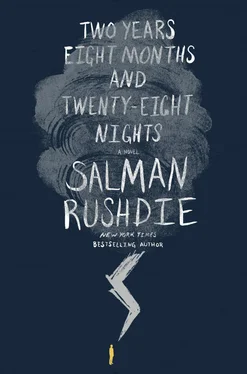That winter Uncle Charles suddenly announced he wanted to make a trip back to India, and took Geronimo with him. After the long years away their hometown was a shock to the eyes, as if an alien city, “Mumbai,” had descended from space and settled on top of the Bombay they remembered. But something of Bandra had survived, its spirit as well as its buildings, and Father Jerry too, still going strong at eighty, still surrounded by the adoring women of his congregation, though probably incapable of doing much about it. The old priest’s mood had darkened with the passing years. His weight had dropped, his voice weakened. He had become, in many ways, a smaller man. “I am happy, Raphael, to have lived in my time and not in this one,” he said over Chinese food. “In my time nobody ever dared say I was not a true Bombayite or a pukka Indian. Now, they say it.” Geronimo Manezes, hearing his original given name after so long, felt a pang of a feeling he recognized as alienation, the sensation of not belonging anymore to a part of oneself, and he understood, also, that Father Jerry, shoveling chicken chow mein into his face as if it were the Last Supper, felt similarly alienated, comparably unnamed. In the new Mumbai, after a lifetime’s service, he was newly inauthentic, excluded by the rise of extremist Hindutva ideology from full membership of his country, from his city, from himself. “I tell you a family story now I never told you before,” Father Jerry said. “I did not tell you because I thought, in my error, you were not truly a part of the family and for this I ask your pardon.” For Father Jerry to ask for forgiveness was a thunderbolt, a further indication that the place to which Geronimo Manezes had returned was no longer the place young Raphael Manezes had left so many years ago, while the hitherto-untold family story sounded, to Geronimo Manezes’s Americanized ear, pretty garbled and irrelevant, a tale of ancient rumored origins in twelfth-century Spain, of conversions, expulsions, intermarriages, wanderings, illegitimate children, jinn, a mythical matriarch called Dunia, a baby-factory who might have been Scheherazade’s sister or maybe a “genie without a bottle to pop or a lamp to rub” and a philosopher-patriarch, Averroës (Father Jerry used the Westernized version of Ibn Rushd’s name and unwittingly conjured up, before Geronimo’s mind’s eye, the face of Bento Elfenbein quoting Spinoza).
“I have little truck with Averroism, a deviant school of thought descended from the priapic doctor of Córdoba,” Father Jerry growled, thumping the table with a little of his old fervor. “Even in the Middle Ages it was considered a synonym for atheism. But if the story of Dunia the fertile maybe-genie-with-the-dark-brown-hair is true, if the Córdoban indeed planted his seed in that garden, then we are his bastard brood, the ‘Duniazát’ from which maybe down the centuries emerged our garbled ‘D’Niza,’ and the curse he laid upon us all is our destiny and our doom: the curse of being out of step with God, ahead of our time or behind it, who can say; of being weathercocks, showing how the wind blows, coal mine canaries, perishing to prove the air is poisonous, or lightning rods, through whom the storm strikes first. Of being the chosen people God smashes with his fist to make an example of, whenever he wants to make a point.”
So I’m being told at this point in my life that it’s okay to be my father’s illegitimate son because we are all a wrong-side-of-the-blanket tribe of bastards, Geronimo Manezes thought, and wondered if this too was part of the old man’s idea of an apology. He found it hard to take the story seriously, or to care about it very much. “If the story is true,” he said, making conversation to be polite, to conceal his lack of interest in this old-time folderol, “we are a little bit of everything, right? Jewslim Christians. Patchwork types.” Father Jerry’s heavy brow furrowed deeply. “Being a little bit of everything was the Bombay way,” he muttered. “But it is out of fashion. The narrow mind replaces the wide skirt. Majority rules and minority, look out. So we become outsiders in our own place, and when trouble comes, and trouble is coming for sure, outsiders have a habit of getting it in the neck before anyone else.”
“By the way,” Uncle Charles said, “the real reason you never heard the family fairy tale from him is that he didn’t want to admit his Jewish origins. Or maybe his genie origins, because genies don’t exist, do they, and if they do they come from the Devil, am I right? And the reason you didn’t hear it from me is that I forgot it years ago. My sexual orientation provided all the outsiderness I needed.” Father Jerry glared at his brother. “I always thought,” he said furiously, “you should have been beaten harder as a child, to thrash the buggery out of you.” Charles Duniza pointed a noodle-wrapped fork at the priest. “I used to pretend to myself that he was joking when he came out with stuff like this,” he told Geronimo. “Now, I can’t pretend anymore.” Lunch ended in a stiff, bad-tempered silence.
Chosen people, Geronimo thought. I’ve heard that term before.
Geronimo Manezes walking his formerly beloved streets realized that something had broken. When he left “Mumbai” a few days later he knew he would not return. He traveled the country with Uncle Charles, looking at buildings. They visited the home built by Le Corbusier in Gujarat for the matriarch of a textile dynasty. The house was cool and airy, protected by brise-soleil structures from the excesses of the sun. But it was the garden that spoke to Geronimo. It seemed to be clawing at the house, snaking its way inside, trying to destroy the barriers that separated exterior space from interior. In the upper regions of the house, flowers and grass successfully surmounted its walls, and the floor became a lawn. He left that place knowing he no longer wanted to be an architect. Uncle Charles went south to Goa but Geronimo Manezes made his way to Kyoto in Japan and sat at the feet of the great horticulturist Ryonosuke Shimura, who taught him that the garden was the outward expression of inner truth, the place where the dreams of our childhoods collided with the archetypes of our cultures, and created beauty. The land might belong to the landowner but the garden belonged to the gardener. This was the power of the horticultural art. Il faut cultiver son jardin didn’t sound so quietist when viewed through Shimura’s vision. But he had been named Hieronymus and knew from the great painter who was his mighty namesake that a garden could also be a metaphor of the infernal. In the end both Bosch’s terrifying “earthly delights” and Shimura’s murmurous mysticism helped him formulate his own thoughts and he came to see the garden, and his work in it, as somehow Blakean, a marriage of heaven and hell.
After the Indian trip Uncle Charles announced his decision to bring his small nest egg back to Goa and retire. He had bought a simple cottage there, and put up for sale the brownstone in St. Mark’s (the Raúls of the 1970s were long gone). The proceeds would take care of his old age. As to the practice, “It’s yours if you want it,” he told Geronimo, who for perhaps the first time in his life knew exactly what he did want. He took over the Greenwich Avenue office and, with a little financial help from Bento Elfenbein, reconstituted it as a gardening-landscaping service, Geronimo Gardener, to which Bento’s treasured daughter Ella added the Mr. that made it sing, that brought him into the fullness of his new American identity. Mr. Geronimo he was to everyone from then on.
Young Ella Elfenbein, of course, was what he really wanted, and unaccountably she wanted him too: motherless Ella, who had no memory of Rakel Elfenbein, lost to cancer when Ella was just two, but who was, for her father, her mother’s very image and reincarnation. It was Ella’s mysteriously unshakable love for Mr. Geronimo, whom, as she liked to say, she had after all partly invented, that led Bento to invest in the man she was going to marry. Ella was an olive-skinned beauty, her chin slightly too prominent, her ears, oddly, the same as his own, a little lacking in the lobes, and her maxillary central incisors a little too vampirishly long, but Mr. Geronimo wasn’t complaining, he knew he was a lucky man. If he believed in souls he would have said she had a good one and he knew, from the stories she couldn’t help telling him, how many men hit on her on a daily basis. But her loyalty to him was as unswerving as it was mysterious. She was, additionally, the most positive spirit Mr. Geronimo had ever encountered. She didn’t like books with unhappy endings, faced every day of her life with joy, and believed that all reverses could be turned to one’s advantage. She accepted the idea that positive thinking could help cure diseases whereas anger made you sick, and one day, searching idly through Sunday morning TV, she heard a televangelist saying God prospers the faithful, he’s going to give you whatever you want, all you have to do is truly want it, and Mr. Geronimo heard her murmur under her breath, “That’s true.” She believed in God as firmly as she hated gefilte fish, she didn’t think men descended from monkeys, and she knew, she told him, that there was a heaven, where she was going eventually, and also a hell, where unfortunately he was probably bound, except that she was going to save him, so that he could have a happy ending too. He decided he would find all this not alien but delightful and their marriage was good. The years ran on. They had no children. Ella was barren. Maybe that was why she loved the idea of his being a gardener. At least there were some seeds he could plant and watch their flowers grow.
Читать дальше












